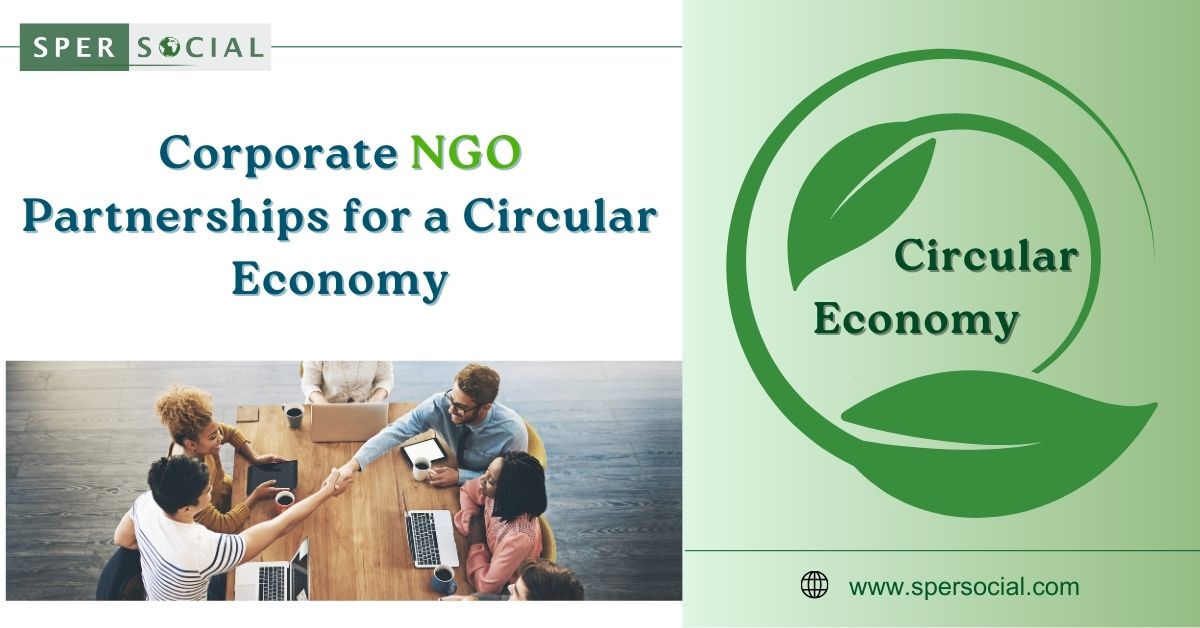
The term "circular economy" may sound like a buzzword, but it holds the key to transforming the way we produce and consume goods. A circular economy is an alternative to the traditional linear model, where products are made, used, and disposed of. Instead of this one-way system, a circular economy focuses on reducing waste and making the most of resources.
Corporate-NGO Partnerships for a Circular Economy
How Corporations Can Benefit from NGO Collaboration: Corporations often struggle with identifying sustainable solutions that work in practice. This is where NGOs come in. By partnering with NGOs, businesses can tap into their expertise on sustainable practices and community engagement, leading to innovative solutions for plastic waste reduction.
Real-World Examples of Corporate-NGO Partnerships: One powerful example is the collaboration between Coca-Cola and World Wildlife Fund (WWF). Together, they launched initiatives to reduce plastic waste through recycling programs and sustainable packaging.
Corporate-Government Collaborations to Drive Circular Economy Policies
Policy Initiatives for Reducing Plastic Waste: Governments can create policies that incentivize businesses to adopt circular practices. For example, imposing taxes on single-use plastics or offering subsidies for recycling initiatives can encourage businesses to innovate.
Incentives for Sustainable Practices: Tax breaks, grants, and green certifications can motivate corporations to invest in circular economy initiatives. These financial incentives make it easier for businesses to justify the initial investment in sustainability.
Case Studies of Successful Corporate-Government Partnerships: One example is Denmark’s partnership with Maersk, one of the world’s largest shipping companies. Together, they developed circular economy policies focused on recycling and sustainable shipping practices. In the UK, the Plastic Packaging Tax is another initiative aimed at encouraging manufacturers to use more recycled content in packaging.
NGO-Government Collaborations for Policy Development
Creating Frameworks for Plastic Waste Reduction: NGOs often collaborate with governments to develop policy frameworks for waste reduction. These collaborations help shape regulations that are both ambitious and practical, ensuring long-term benefits for society and the environment.
The Role of Research in Influencing Policy: Research conducted by NGOs provides the data governments need to implement meaningful policy changes. Whether it’s studies on the impact of plastic on marine life or the effectiveness of recycling programs, research drives policy innovation.
Examples of Policy Shifts Due to NGO-Government Collaboration: The European Union’s Single-Use Plastics Directive was heavily influenced by research and advocacy from environmental NGOs. This directive bans a wide range of single-use plastic items and has set the stage for similar policies worldwide.
Tri-sector Collaborations: Corporations, NGOs, and Governments
Benefits of Multi-stakeholder Partnerships: By working together, corporations, NGOs, and governments can leverage each other’s strengths. While corporations provide resources and scale, NGOs offer expertise and advocacy, and governments create the policy frameworks needed to drive change.
How Each Sector Can Contribute to the Circular Economy: Corporations can invest in sustainable product design, NGOs can educate and advocate, and governments can create the necessary legal frameworks. Together, they form a powerful alliance to reduce plastic waste.
Lessons Learned from Successful Tri-sector Partnerships: The New Plastics Economy Initiative by the Ellen MacArthur Foundation is an example of a successful tri-sector partnership. This initiative brings together governments, businesses, and NGOs to rethink plastic packaging and develop circular solutions for waste.
Challenges in Building Partnerships for a Circular Economy
Balancing Interests and Priorities: Different stakeholders often have conflicting priorities. Corporations may focus on profits, while NGOs prioritize environmental impact. Finding a balance can be challenging but is crucial for a successful partnership.
Overcoming Financial and Logistical Barriers: Implementing circular economy practices often requires significant upfront investment. However, long-term savings and environmental benefits make these investments worthwhile.
Ensuring Long-Term Commitment: Sustaining partnerships requires long-term commitment from all parties. This includes financial support, policy development, and continuous innovation.
The Future of Circular Economy Partnerships
Evolving Roles of Stakeholders: As the circular economy grows, so do the roles of stakeholders. Corporations will need to invest more in sustainable practices, governments will create more comprehensive policies, and NGOs will continue to drive awareness and research.
Technological Innovation as a Driver: Technological advancements, such as biodegradable plastics and enhanced recycling technologies, will play a critical role in supporting circular economy initiatives.
Expanding Beyond Plastic Waste: While plastic waste is a significant focus, the circular economy can extend to other materials, such as textiles, electronics, and even food waste.
Conclusion
In the journey towards a circular economy, partnerships between corporations, NGOs, and governments are not just beneficial—they are essential. By combining resources, expertise, and influence, these collaborations can pave the way for a more sustainable, waste-free future.
SPER SOCIAL
SPER SOCIAL, your premier destination for innovative solutions in Corporate Social Responsibility (CSR) and Environmental, Social, and Governance (ESG) initiatives. At SPER SOCIAL, we pride ourselves on our expertise, tailored solutions, global perspective, and commitment to long-term impact. With a passion for sustainability and a dedication to making a difference, we empower organizations to navigate the complexities of CSR and ESG with confidence and purpose.
#303-304, Tower B, Noida One, Sector 62, Noida, India
contact@spersocial.com
+1-347-460-2899
+91-959-915-8047
